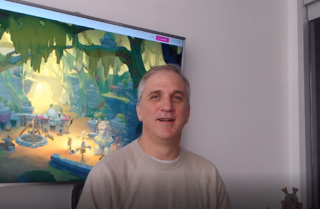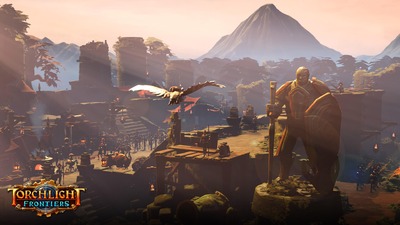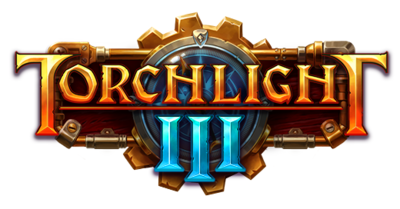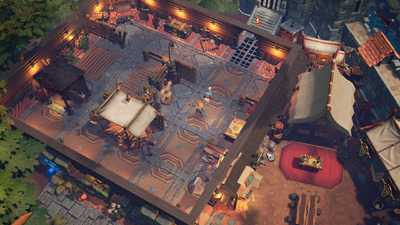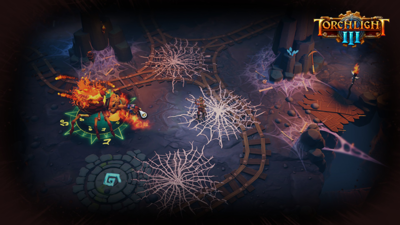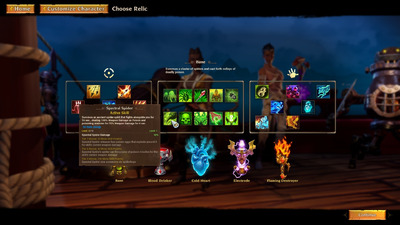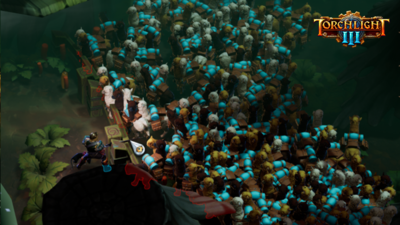Interview with Max Schaefer
JeuxOnline: Hello Max, and thank you for this interview.
In 2016 you left Runic Games to found Echtra Games and start developing Torchlight Frontiers, an MMO set in the Torchlight universe. Why this choice of a new studio rather than developing the game within Runic Games, which is historically the franchise’s studio?
Max Schaefer: This was mostly Runic Games’ choice. The studio was sort of burned out from Torchlight I and II, and wanted to do something else. Meanwhile, the project lead, Travis Baldree, and lead designer, my brother Erich Schaefer, split off to form their own, much smaller company. So if there was to be a Torchlight III, it had to be a new studio.
MMOs are a genre that has lost some of its appeal to western publishers recently. Was this project always meant to be an MMO set in the Torchlight universe when you created Echtra Games?
Everyone has something different in mind when they say MMO. Our goals with Torchlight III were to make a more persistent world, with some MMO elements, but never to deviate too far from the franchise's ARPG roots. Initially, it was also slated to be a F2P game, and the change away from that was probably the more dramatic change rather than the MMO elements, most of which we kept. Honestly, from the beginning, this was the vision for the Franchise, even when we made the single player Torchlight I.
You are the co-founder of Runic Games and the co-creator of the Torchlight Franchise, and therefore can guarantee a certain continuity, but most of the staff at Echtra’s are new to the franchise. According to you, what issues did the studio face in order to reprise this well-established franchise?
We did have to start a studio from nothing, and that’s challenging. We didn’t even have an office or furniture or computers, so it really was from nothing. But, we were fortunate to have a few key members from Runic, including our co-founder Justin Miller on all things related to the servers and multiplayer, and also composer Matt Uelmen. Better than that, we have several members of the team that worked on Diablo II and the expansion, including project lead Tyler Thompson and Art Director David Glenn. So we had an experienced and qualified crew, and we’ve built an amazing team over time.
The other challenge we faced was the switch from the old custom Torchlight engine to using Unreal, which makes the console versions possible. This was new tech for us, and there was a learning curve to molding the Unreal engine to work for a randomized ARPG. Then, of course, we are shipping multiple platforms, which we’ve never done before. And if all that weren’t enough, Covid came along and closed our office and made us all work from home. So all things considered, this was a difficult project, but the team has responded and is delivering.
After several testing phases, it was decided to change the direction of the game and transition from an MMO to a solo/co-op experience more in the line of the previous two titles. How has such a decision been made on a project that has already been in development for so long?
It wasn’t as radical a change as you might think. The business model changed, so that meant removing the F2P loops and mechanics, and/or replacing them with something more appropriate for a one-time purchase game. Fortunately, that means we can just focus on the fun, and not on creating pinch points or incentives for players to make purchases.
The other big change was going from our system of “horizontal content”, which meant that every biome or region in the game was its own challenge, which you could do in any order. Based on the mechanics of each zone, you’d need different equipment. This was designed so we could add content in the future without it being either end-game or early-game - it was just more content that anyone could enjoy. But that was a difficult sell to players, and it never quite worked right. So we just re-organized to make them linear, which helped in the story telling and was more comfortable for players.
The main MMO-ish parts, like shared towns, persistent player forts, and random encounters were preserved intact. So it feels like a multiplayer game, and players are more enfranchised in the world than they have been in previous iterations.
You had the intention of implementing a horizontal progression which sounds very exciting on paper, but in reality most developers who tried this came back to a more vertical progression system. Did you also encounter some issues with it? And what was the reason to decide to go back to a more normal progression?
I think we could have made it work, but it’s not easy. And the bigger problem was Torchlight fans were not accepting of the F2P model. Which is understandable because players have been burned many times by this mechanism, so there was always skepticism about our motives. In the end, both the community and the game itself were telling us that we should move in a more traditional way. They were right!
Such a decision must have been taken with Perfect World’s approval; how did you pitch this change to them? And how did you manage to convince them?
Perfect World has been an amazing partner in this journey, and are supportive of our decisions, which, of course, we made in consultation with them. One thing that worked in our favor, is that Perfect World had just published the game Remnant: From the Ashes, which transitioned from a F2P game to a premium model just like us, and it was very successful. I would say that the decision was mutual and there was not a lot of convincing necessary.
Even though Echtra is an American studio and Torchlight III appeals to a western audience (most of the feedback comes from there), the game also aims at the Chinese market which has its own cultural differences. Does Perfect World help you in publishing a game that caters for the Chinese players or do you have the freedom of your own creative choices?
It is very difficult to try to make a game for a specific audience. We tend to make the game that we want to play ourselves, and just hope things work out, whether it is the US/Europe market, or China or the rest of Asia. Fortunately, people like good games all over the world, and Chinese players like ARPGs for the same reasons they do in other markets. We love the Asian markets because they are hardcore players, and really test our systems and designs.
During the transition from Torchlight Frontiers to Torchlight III, what were the main difficulties you had to overcome? And what were the mistakes you needed to avoid?
Players really supported the change, but they also do not like change in general, so one of the things we had to confront was player theories that the change was forced on us, or that it meant the project was in trouble. These are both incorrect. You have to be willing to pivot, adapt, and change during development. We are very public about our game, and we had it in front of a live, limited audience for 2 years - which is both good and bad. It means that people are seeing a game early in development, and that means they see bugs, systems that are not working right, issues with balance, all kinds of things that are normal in development, but are usually hidden from the public.
As I mentioned before, at a certain point, the game itself starts to tell you what it wants to be. In our case, it was also consistent with the feedback from players. So the system worked, we were able to listen to ourselves, our players, and the game, and make good decisions. The difficulties we faced were related to the fact that this was all happening right in front of players. Nothing was private or hidden. Making games is a messy and chaotic process, but people don’t always know that, so seeing major changes being made while they are playing the game can be unsettling. We have gone to great lengths to make sure people know we are making the game WITH them, and the changes we make are very strongly influenced by them.
After years of Alpha and Beta testing the game was finally launched on Early Access via Steam this summer. It was announced during the PC Gaming show live stream and a huge amount of players were eventually let down by the server issues and the fact that it was an Early Access build. The launch and the closing of an Early Access game are very important; in hindsight, if you could do something differently, what would it be?
The first time you put any online game in front of an audience that is 10x bigger than what you have done before, things break. And they did! Even though we had the servers up and largely stable within 48 hours, the damage was done and we got review-bombed on Steam. But that’s fine, it’s better to happen at the start of Early Access than at launch, and it will all be forgotten in the long run. People tend to over-dramatize early struggles, and forget that many of the huge games they enjoy today had very difficult launches.
We also used Early Access in the way it’s supposed to be used - to get the game in front of the public early enough that you can make meaningful changes based on their feedback. By necessity, this means putting the game in front of them during intense development, which means there are bugs, incomplete systems, and broken balance. Even though we messaged this as well as we could, it is still a shock for some buyers to not get a complete finished game when they pay their hard-earned money for it. Also, many other companies have used Early Access for funding or other reasons not related to responding to player feedback. That has made some gamers jaded about the whole idea, and they always assume the worst.
We do not blame these gamers, and we accept the rough reviews we got on Steam. They do deserve a fun time after they have paid $30, which is why we stayed up all night until the servers were back online. But it will all be forgotten at launch - the final product is what we’ll eventually be judged on, and hopefully this process will result in a game that the players like. We have made more significant, meaningful changes based directly on player feedback on this game than on any project I have worked on in the past. So we don’t know 100% yet if we’d do anything differently, because the whole idea is to get to the best possible launch day. And we aren’t quite there yet. As I write this, the team is furiously fixing bugs, adjusting tuning, and working very hard to get the game finished in a way players like. We can see from recent reviews, and things like retention and player behavior data that it is working, but we cannot be 100% sure until we launch.
According to you, what are the keys elements for a successful Early Access game for the players, and for the developers?
It is all about the relationship between players and developers. To succeed in Early Access, we need to establish trust. Players need to see that we are listening, changing, and fixing things for them. They need to feel like they are a part of the process. To us, Early Access players are an essential part of the process. They will have an impact on the game that nobody else will. So it’s all about giving ourselves the opportunity to make meaningful changes to the game, and establishing that relationship with the early access players so there’s mutual respect and trust. That is hard to do - people these days are cynical, skeptical, and jaded. But we’re determined to make it work, even though we know we can’t please everyone.
What is the DNA of a Torchlight game? What does it take for it to deserve the name?
Torchlight’s DNA is, of course, related to the DNA deep in games like Diablo that we have previously worked on. The idea is fairly simple - take those fantasy RPG experiences from our childhoods, with things like pen and paper Dungeons and Dragons, and translate them into visual, audio, and tactile experiences that put you directly into that world, instead of abstracting it on paper. For Torchlight specifically, the idea is to make it a little more light-hearted and take itself less seriously than some of the darker, gothic ARPGs. We can have a little more fun with the world, the monsters, items, and characters, and make it a more pleasant place to spend a lot of hours.
More than anything, we want your experience to be a roller coaster adventure of exploration, loot, monster vanquishing, and character building fun. Our biggest challenge is living up to the previous Torchlight games, and the very high expectations of the community. It is hard to make the 3rd installment in a popular franchise, and almost impossible to meet all the expectations of fans of the first ones, while also offering enough new and different to warrant a new version.
Even Though Torchlight III claims to be the successor of the first two episodes, we can notice some differences in the formula like the removal of Attributes. What was the reasoning behind these types of changes? Do you think that the recipe that worked several years ago can still work today, or on the contrary, people’s expectations are different?
The idea of removing attributes was just to strip away a system that was not adding enough. One of the goals in any Torchlight game is to offer players many different viable build paths for your character, and the deeper you get into the attributes, the more constrained you are in what you can do. Skill points and choice of items are the backbone of your character builds, so we focused there. Of course, there will be people who like this, and people who do not, so the success is going to be determined by the final product, not our theories.
I think people's expectations change over time for sure, but at the same time, good fun gameplay is eternal. But the ARPG market is maturing, there are competitors that center on one aspect or another, whether it's the more purely MMO versions like Path of Exile, or even the more distilled and simplistic versions like Minecraft Dungeons. I think the challenge for us is to focus on where Torchlight is strong, and push it to the next logical level. For us, it was more about solidifying a more immersive online experience, with forts and shared towns, and a feeling of permanence and persistence to the world, and pushing our fantasy-steampunk elements to the next level with our character classes and skills. It's never a good idea to compare lists of bullet points of features. That's not how the public's tastes evolve, or what they want. They want authenticity and to be transported to an imaginary world away from their real-world troubles. There are a million ways to get to that, sometimes it's getting more complicated, sometimes it's simplification, and it's often intangible, but it's always more about being true to the vision of the game rather than specific features.
The game is scheduled for release “later this year”, but we already had a change of direction and it was delayed. What will make you confident enough about the game to say that it is ready for launch?
We should probably just never talk about releases. We do not really think about dates, and so I hesitate to say we are delayed. We are just still in development. Games are only “delayed” till they ship, but if they’re good, nobody cares. Diablo II was a year “late”, and had a terribly rough launch with the servers. At the time, it was a huge, apocalyptic crisis, but then immediately after getting it straightened out, nobody cared. Nobody cares if it is late once it ships, as long as it is good. We will be confident it is ready when our bug lists are low, our play sessions are fun and successful, and all the platforms are through cert and ready to go. Then, we launch and cross our fingers!
Bonus question: What can you tell our readers about the Alpaca secret level? (Or any other exclusive info)
Whether or not there is a secret Alpaca level, I can tell you that there are some things we will never reveal, things that will never be discovered, and things that will not be discovered for a long time. :)
- Entretien avec Max Schaefer
- Interview with Max Schaefer
Réactions
Pas de compte JeuxOnLine ?
Créer un compte| Plateformes | Nintendo Switch, PlayStation 4, Windows, Xbox One |
|---|---|
| Genres | Action, action-rpg, hack 'n' slash, fantasy, médiéval |
| Alpha-test |
13 juin 2020 |
| Sortie |
13 octobre 2020 (Windows) 13 octobre 2020 (Xbox One) 13 octobre 2020 (PlayStation 4) 22 octobre 2020 (Nintendo Switch) |
Que pensez-vous de Torchlight III ?
1 jolien y joue, 2 y ont joué.
-
26 mai 2021
-
5 avril 2021
-
6 janvier 2021
-
29 septembre 2020
-
18 septembre 2020
